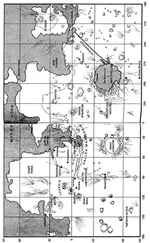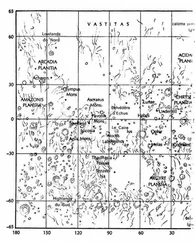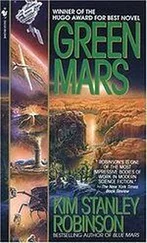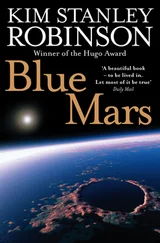Kim Robinson - Blue Mars
Здесь есть возможность читать онлайн «Kim Robinson - Blue Mars» — ознакомительный отрывок электронной книги совершенно бесплатно, а после прочтения отрывка купить полную версию. В некоторых случаях можно слушать аудио, скачать через торрент в формате fb2 и присутствует краткое содержание. Год выпуска: 1996, ISBN: 1996, Издательство: Spectra/Bantam Dell/Random House, Жанр: Космическая фантастика, на английском языке. Описание произведения, (предисловие) а так же отзывы посетителей доступны на портале библиотеки ЛибКат.
- Название:Blue Mars
- Автор:
- Издательство:Spectra/Bantam Dell/Random House
- Жанр:
- Год:1996
- ISBN:0-553-10144-7
- Рейтинг книги:3 / 5. Голосов: 1
-
Избранное:Добавить в избранное
- Отзывы:
-
Ваша оценка:
- 60
- 1
- 2
- 3
- 4
- 5
Blue Mars: краткое содержание, описание и аннотация
Предлагаем к чтению аннотацию, описание, краткое содержание или предисловие (зависит от того, что написал сам автор книги «Blue Mars»). Если вы не нашли необходимую информацию о книге — напишите в комментариях, мы постараемся отыскать её.
Green Mars
The Martian Chronicles
Dune
Piblishers Weekly st
Blue Mars — читать онлайн ознакомительный отрывок
Ниже представлен текст книги, разбитый по страницам. Система сохранения места последней прочитанной страницы, позволяет с удобством читать онлайн бесплатно книгу «Blue Mars», без необходимости каждый раз заново искать на чём Вы остановились. Поставьте закладку, и сможете в любой момент перейти на страницу, на которой закончили чтение.
Интервал:
Закладка:
Actually, Nanao told him, most of the basins were intensively cultivated. “This basin was planted by Abraham.” Each little region was the responsibility of a certain gardener or gardening group.
“Ah!” Sax said. “And fertilized, then?”
Tariki laughed. “In a manner of speaking. The soil itself has been imported, for the most part.”
“I see.”
This explained the diversity of plants. A little bit of cultivation, he knew, had been done around Arena Glacier, where he had first encountered the fellfields. But here they had gone far beyond those early steps. Labs in Sabishii, Tariki told him, were trying their best to manufacture topsoil. A good idea; soil in fellfields appeared naturally at a rate of only a few centimeters a century. But there were reasons for this, and manufacturing soil was proving to be extremely difficult.
Still, “We pick up a few million years at the start,” Nanao said. “Evolve from there.” They hand-planted many of their specimens, it seemed, then for the most part left them to their fate, and watched what developed.
“I see,” Sax said.
He looked more closely yet. The clear dim light: it was true that each great open room displayed a slightly different array of species. “These are gardens, then.”
“Yes … or things like that. Depends.”
Some of the gardeners, Nanao said, worked according to the precepts of Muso Soseki, others according to other Japanese Zen masters; others still to Fu Hsi, the legendary inventor of the Chinese system of geomancy called feng shui; others to Persian gardening gurus, including Omar Khayyam; or to Leopold or Jackson, or other early American ecologists, like the nearly forgotten biologist Oskar Schnell-ing; and so on.
These were influences only, Tariki added. As they did the work, they developed visions of their own. They followed the inclination of the land, as they saw that some plants prospered, and others died. Coevolution, a kind of epigenetic development.
“Nice,” Sax said, looking around. For the adepts, the walk from Sabishii up onto the massif must have been an aesthetic journey, filled with allusions and subtle variants of tradition that were invisible to him. Hiroko would have called it areoformation, or the areophany. “I’d like to visit your soil labs.”
“Of course.”
They returned to the rover, drove on. Late in the day, under dark threatening clouds, they came to the very top of the massif, which turned out to be a kind of broad undulating moor. Small ravines were filled with pine needles, sheered off by winds so that they looked like the blades of grass on a well-mowed yard. Sax and Tariki and Nanao again got out of the car, walked around. The wind cut through their suits, and the late-afternoon sun broke out from under the dark cloud cover, casting their shadows all the way out to the horizon. Up here on the moors there were many big masses of smooth bare bedrock; looking around, the landscape had the red primal look Sax remembered from the earliest years; but then they would walk to the edge of a small ravine, and suddenly be looking down into green.
Tariki and Nanao talked about ecopoesis, which for them was terraforming redefined, subtilized, localized. Transmuted into something like Hiroko’s areoformation. No longer powered by heavy industrial global methods, but by the slow, steady, and intensely local process of working on individual patches of land. “Mars is all a garden. Earth too for that matter. This is what humans have become. So we have to think about gardening, about that level of responsibility to the land. A human-Mars interface that does justice to both.”
Sax waggled a hand uncertainly. “I’m used to thinking of Mars as a kind of wilderness,” he said, as he looked up the etymology of the word garden. French, Teutonic, Old Norse, gard, enclosure. Seemed to share origins with guard, or keeping. But who knew what the supposedly equivalent word in Japanese meant. Etymology was hard enough without translation thrown into the mix. “You know — get things started, let loose the seeds, then watch it all develop on its own. Self-organizing ecologies, you know.”
“Yes,” Tariki said, “but wilderness too is a garden now. A kind of garden. That’s what it means to be what we are.” He shrugged, his forehead wrinkled; he believed the idea was true, but did not seem to like it. “Anyway, ecopoesis is closer to your vision of wilderness than industrial terra-forming ever was.”
“Maybe,” Sax said. “Maybe they’re just two stages of a process. Both necessary.”
Tariki nodded, willing to consider it. “And now?”
“It depends on how we want to deal with the possibility of an ice age,” Sax said. “If it’s bad enough, kills off enough plants, then ecopoesis won’t have a chance. The atmosphere could freeze back onto the surface, the whole process crash. Without the mirrors, I’m not confident that the biosphere is robust enough to continue growing. That’s why I want to see those soil labs you have. It may be that industrial work on the atmosphere remains to be done. We’ll have to try some modeling and see.”
Tariki nodded, and Nanao too. Their ecologies were being snowed under, right before their eyes; flakes drifted down through the transient bronze sunlight at this very moment, tumbling in the wind. They were open to suggestion.
Meanwhile, as throughout these drives, their young associates from Da Vinci and Sabishii were running over the massif together, and returning to Sabishii’s mound maze babbling through the night about geomancy and areo-mancy, ecopoetics, heat exchange, the five elements, greenhouse gases, and so on. A creative ferment that looked to Sax very promising. “Michel should be here,” he said to Nanao. “John should be here. How he would love a group like this.”
And then it occurred to him: “Ann should be here.”
So he went back to Pavonis,leaving the group in Sabishii talking things over.
Back on Pavonis everything was the same. More and more people, spurred on by Art Randolph, were proposing that they hold a constitutional congress. Write an at least provisional constitution, hold a vote on it, then establish the government described.
“Good idea,” Sax said. “Perhaps a delegation to Earth as well.”
Casting seeds. It was just like on the moors; some would sprout, others wouldn’t.
He went looking for Ann, but found she had left Pavonis — gone, people said, to a Red outpost in Tempe Terra, north of Tharsis. No one went there but Reds, they said.
After some thought Sax asked for Steve’s help, and looked up the outpost’s location. Then he borrowed a little plane from the Bogdanovists and flew north, past Ascraeus Mons on his left, then down Echus Chasma, and past his old headquarters at Echus Overlook, on top of the huge wall to his right.
Ann too had no doubt flown this route, and thus gone by the first headquarters of the terraforming effort. Terraforming… there was evolution in everything, even in ideas. Had Ann noticed Echus Overlook, had she even remembered that small beginning? No way of telling. That was how humans knew each other. Tiny fractions of their lives intersected or were known in any way to anybody else. It was much like living alone in the universe. Which was strange. A justification for living with friends, for marrying, for sharing rooms and lives as much as possible. Not that this made people truly intimate; but it reduced the sensation of solitude. So that one was still sailing solo through the oceans of the world, as in Mary Shelley’s The Last Man, a book that had much impressed Sax as a youth, in which the eponymous hero at the conclusion occasionally saw a sail, joined another ship, anchored against a shore, shared a meal — then voyaged on, alone and solitary. An image of their lives; for every world was as empty as the one Mary Shelley had imagined, as empty as Mars had been in the beginning.
Читать дальшеИнтервал:
Закладка:
Похожие книги на «Blue Mars»
Представляем Вашему вниманию похожие книги на «Blue Mars» списком для выбора. Мы отобрали схожую по названию и смыслу литературу в надежде предоставить читателям больше вариантов отыскать новые, интересные, ещё непрочитанные произведения.
Обсуждение, отзывы о книге «Blue Mars» и просто собственные мнения читателей. Оставьте ваши комментарии, напишите, что Вы думаете о произведении, его смысле или главных героях. Укажите что конкретно понравилось, а что нет, и почему Вы так считаете.












